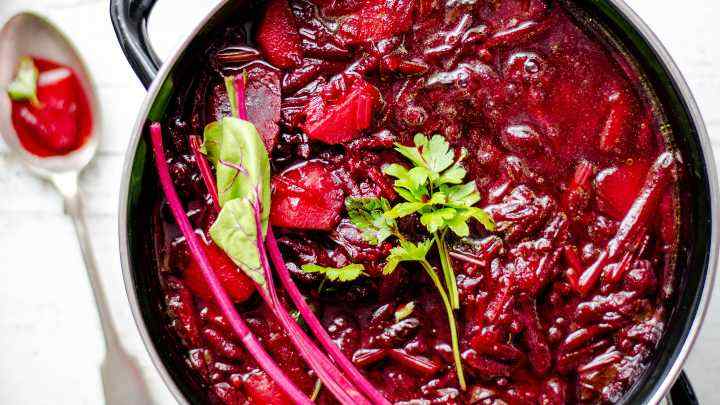If you’ve ever asked, “are beets good for your kidneys or not,” then you’ve found your answer. Some people indeed believe beets can help cleanse and detoxify the kidneys, while others think that they may put a strain on the organs.
So, are beets suitable for your kidneys? The answer is no, but there are still a few key things to consider.
Read on to see how beets, beetroots, and beet juice affects your kidney.
What are beets?
Beets are root vegetables that are typically red or purple and can be eaten cooked or raw. They have a slightly sweet and earthy taste and are often used in salads or as garnish.
Beets are a good source of vitamins and minerals, including iron and potassium. They also contain antioxidants and phytochemicals that may help protect against some chronic diseases.
Can beets damage your kidney?
Yes, but it depends. Beets are high in oxalates (which are compounds that can form kidney stones). If you’re susceptible to an oxalate-containing kidney stone or have had a kidney stone in the past, it’s best to avoid eating beets.
If you’ve never had such kidney-related issues, the risk of developing kidney stones from eating beets is low when you consume them moderately.
Is it safe to eat raw beets?
Yes, it is safe to eat raw beets. Eating raw beets is one of the best ways to maximize their nutritional benefits.
Raw beets are a good source of fiber, vitamins, and minerals, and they contain high levels of antioxidants and other nutrients that are thought to be beneficial for health.
However, you may experience digestive issues if you eat them in large quantities. If you’re concerned about this, you can cook the beets before eating or try adding them to smoothies or juices instead.
SEE: What Does Cactus Taste Like?
Is beet juice good for your liver and kidneys?
Yes, but it depends. Some of the nutrients found in beet juice include vitamins C and A, potassium, magnesium, and iron. Antioxidants present in beet juice include betaine and betanin.
These substances may help protect cells from damage and improve liver function. Additionally, the nitrates found in beet juice may help relax blood vessels and improve blood flow to the kidneys.
While beet juice is good for liver and kidney health, it might trigger your health issues if you already have kidney problems. That’s because it’s high in potassium, and your kidneys will have to work to filter out excess amounts of potassium.
Are pickled beets good for kidneys?
Yes, but there are some limitations. Pickled beets are a good source of antioxidants, which can help protect your cells from damage. They also contain potassium and are a good source of vitamins and minerals vital to kidney function.
However, if you’re predisposed to kidney stones, it is essential to talk to your doctor before including pickled beets in your diet.
Who should avoid beetroot?
Some people should avoid beetroot or eat it only in moderation. This includes people with:
Gastrointestinal problems: Beetroot can cause common health issues like indigestion, diarrhea, and other stomach discomforts. If you have a history of gastrointestinal problems, you may want to avoid beetroot or eat it in moderation.
Kidney problems: Beetroot contains high levels of oxalates, which can increase the risk for kidney stones in some people. If you currently have kidney stones, you may want to avoid beetroot.
Anemia: Beetroot can interfere with iron absorption and worsen anemia in some people. If you have anemia, you should avoid beetroot or eat it in moderation.
Allergies: Some people are allergic to beetroot. If you have a history of allergies, you should avoid beetroot. Eating too many beets can also lead to gout because the oxalates in it can spike your uric acid level.
What foods help repair kidneys?
A few different foods can help repair and support kidney health. These include:
Cranberries: Cranberries are rich in antioxidants that help reduce inflammation in the body, including in the kidneys. They also promote urinary tract health and can help prevent UTIs.
Garlic: Garlic has natural antibiotic and anti-inflammatory properties. It can help fight infection and reduce inflammation throughout the body, including in the kidneys.
Olive oil: Olive oil is another food with anti-inflammatory properties. It can help protect kidney cells from damage and improve kidney function.
Generally, a diet that is high in antioxidants, phytochemicals, and fiber may help protect the kidney from further damage. These foods include fruits, vegetables, whole grains, and legumes. It’s better to avoid foods that are high in phosphorus.
FAQs
Can beetroot juice spike kidney stones?
Yes, it can. If you have kidney stones or a history of kidney damage, it’s best to avoid beetroot juice. Beetroot is rich in oxalates which can aggravate the stones in the kidney.
Is it okay to drink beet juice every day?
Yes, ordinarily, a glass of beet juice every day is harmless. It can provide you with several health benefits, including improved blood circulation, lower blood pressure, and boost overall health.
However, if you have kidney stones, your doctor might ask you to minimize your intake or avoid beet juice till you recover fully.
Can you drink beet juice with kidney disease?
No, you shouldn’t. It is high in oxalates and can contribute to stone-forming. It’s also okay to ask your doctor for individual advice.
Conclusion
Beetroot and beetroot juice can have various health benefits, but some risks are associated with consuming them. If you have any kidney issues, it’s best to speak to your doctor before including them in your diet.
Are beets good for kidneys? Now you know they aren’t. If you must include beets in your diet, consume them in moderate proportions. Overall, a healthy diet that includes a variety of fruits, vegetables, and whole grains is the best way to support kidney health.
Thank you for reading.
Did you enjoy reading? Find other related guides here on Cheffist.







